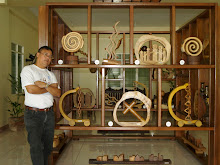I. PHILIPPINE POLITICS, CHURCH AND CIVIL SOCIETY
Approaches in addressing the political crisis:
"The Church values the democratic system inasmuch as it ensures the participation of the citizens in making political choices, guarantees to the governed the possibility both of electing and holding accountable those who govern them, and of replacing them through peaceful means when appropriate." (Centesimus Annus, # 46)
"As bishops, we believe that at the bottom of our political chaos is a crisis of moral values, a crisis of truth and justice, of unity and solidarity for the sake of the common good and genuine peace. Truth has become a victim of political partisanship as well as of transactional politics. Moral accountability and justice for crimes, such as the killings of journalists and labor leaders, are yet to be realized." (CBCP, January 2006)
To promote a spirituality of public service, integrity and stewardship among public servants and citizens groups alike. These forms of social spirituality should counteract the persistent evils of gambling, drug-pushing, usury, destruction of our environment, and corruption in public office."(CBCP, January 2006)
II. CONCERNED CITIZENS IN TRANS-PARTISAN POLITICS
(Renewing Politics through Gospel ValuesPCP II, 351)
A DREAM:
Citizens’ Movement for Good Governance"TINIG SA ILANG"
Movement for a Concerned Citizenry
Why TINIG SA ILANG?
- "Tinig sa Ilang" points out to the person of St. John the Baptist.
"I am, as Isaiah prophesied,: a voice that cries in the wilderness: make straight way for the Lord" (John 1:23; cf. Is. 40:3).
St. John the Baptist is the Patron Saint of Daet, capital town of Camarines Norte. - TINIG will always be a VOICE that echoes in the "wilderness" of our society.
"ILANG" (wilderness) will stand for:
I - Illegal activities
L – Life Issues/Labor Issues
A –Anomalies & Corruptions
N – Environmental Concerns
G – Good Governance
Purpose of TINIG SA ILANG:
Bishop Almoneda envisions the inception of a movement composed of Lay Catholic Faithful who will champion the promotion of human development through advocacy on social issues prevalent to our province and in our country in general. TINIG will represent citizens’ voice on
- I – ISSUES affecting the
- L – LOCAL
- A – AND
- N – NATIONAL
- G - GOVERNMENT
Advocacy against:
1.ILLEGAL ACTIVITIES like jueteng and any form of illegal gambling; illegal fishing, illegal logging, etc
Promotion related to:
2. LIFE ISSUES – promotion of culture of life vs. culture of death; advocacy on pro-life issues; promotion of human dignity and human rights and duties
LABOR ISSUES – dignity of human labor, protection of workers’ rights.
Advocacy against any forms of:
3. ANOMALIES AND CORRUPTIONS
Protection of
4. NATURAL RESOURCES/ENVIRONMENT
Advocacy on
5. GOOD GOVERNANCE
Features of TINIG SA ILANG:
1. TINIG is a Catholic Lay Movement coming from different sectors of our society.
2. TINIG works for political education and electoral reforms. Each one’s vote is sacred.
3. TINIG provides a neutral forum for all candidates and parties to present their platforms.
4. TINIG monitors winning candidates who are expected to report every quarter.
5. TINIG works towards the new politics of "principles, party platforms and people’s participation."
Possible Learnings from TINIG experience:
1. A small, committed group of citizens can make a difference in elections.
2. Vote-buying is diminished.
3. Public officials become aware that they are being monitored and accountable for their actions.
4. Separation of the institutional Church and State is observed.
5. Post-election activities take the form of regular social auditing and engage citizens up to the next elections.
"The Church, by reason of her role and competence, is not identified with any political community nor found by ties to any political system. It is at once the sign and the safeguard of the transcendental dimension of the human person."
(Church in the Modern World, no. 76)

